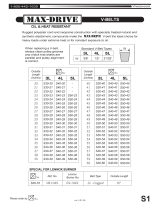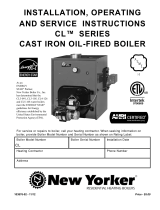
Repolymerization and New
Fuels: Biofuels and Low-Sulfur
Extensive testing has not been completed on the
stability of either biofuels or low-sulfur heating oil.
However B-5, the likely standard for biofuels in the
near-term contains only 5% biofuel and 95% of
today’s catalytically cracked petroleum-based fuel.
Its stability characteristics are unlikely to be
different than those of today’s fuels.
Low-sulfur fuels hold a great deal of promise to
keep heating system cleaner downstream of the
nozzle (heating chamber to flue pipe). Brookhaven
National Laboratory published impressive photos
showing that low sulfur fuel reduces corrosion in
heating chambers. This should lengthen service
intervals and reduce service time when service is
performed.
However, questions remain about low-sulfur fuels’
stability in storage and consequently it’s impact on
system components “upstream” of the nozzle. Low
sulfur fuels will continue to be catalytically cracked,
as they are today and ultra-low sulfur fuels may be
more susceptible to breakdown due to the
formation of peroxides. However, part of the
process that removes sulfur includes the
introduction of hydrogen to the fuel and it may
improve the fuel’s stability.
In other words, more research needs to be done.
Chemical Additives
Today’s additive packages provide the best
solution to problems created by fuel stability. In
fact, most fuel-related problems have been
eliminated by dealers who use premium additive
packages along with proper tank maintenance and
filtration practices.
The following list of terms should help you evaluate
additive products.
Solvents Solvents are in many fuel additives as
carriers for other chemicals or as the primary active
ingredient. They break up sludge, but generally do
so too rapidly, creating a rash of service problems
when they are first used. Fuel oil dealers are
advised to avoid solvent based additives.
Stabilizers Stabilizers reduce the formation of
insolubles due to oxidation and sometimes
repolymerization.
Dispersants Dispersants do not allow particulate
to agglomerate and they separate existing
agglomerated particles. They do this chemically
and are consumed by the process.
Antioxidants Antioxidants slow the oxidation
process that leads to some sediment formation.
Biocides Biocides dissolve in either the fuel or
water or both and kill bacteria and fungus.
Rust inhibitors Rust inhibitors slow the process
that ends in rust by forming films or by chemically
neutralizing one of the rust forming chemical
mechanisms.
Demulsifiers Demulsifiers change the surface
tension of the fuel and/or water causing a clear
separation of water and fuel.
Cold-flow improvers Products that reduce
gelling and keep oil flowing when cold meet a
tremendous need in the oil heating industry.
However, they are an entirely separate class of
products from additives that prevent sludge
formation. Cold-flow improvers do not extend the
storage life of fuel.
Beckett Additives
Beckett Additives, LLC offers a premium additive
package that offers net cost reductions in the first
year of use. For more information, call us at 1-866-
645-2873 or visit our website at
www.beckettadditives.com.
UtraGuard™ is a registered trademark of Fuel Management Services of Jeffersonton, Virginia. It is
roduced b
International Lubrication and Fuels Cor
oration.






